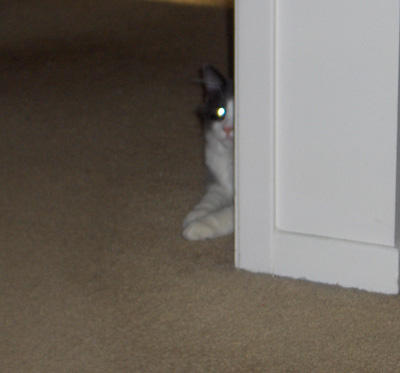Chiaroscuro
I swear the two words I'm writing about today came up in conversation in the last twenty-four hours. I don't just comb the dictionary looking for stuff to write about--honest. I mean, how sad and geeky would that be? Although I suppose having words pop up in everyday speech and then rushing to the dictionary to look them up is also geeky in its own way; it's just not as deliberately geeky.
As soon as I had uttered the phrase "take umbrage" I began to wonder how it was related to the paint known as "burnt umber". I tucked the thought away and continued the conversation, and only later looked up the two words: I can now report to you that it's all a bit of a tangle, but as I had suspected, they're both descended from French "ombre" and/or Italian "ombra", both of which mean "shadow", from the Latin "umbra". (Yes, this is also the source of our "umbrella".) The Latin may have its source in "Umbria", a region in Italy; but "umber" itself apparently takes its name from shadows because burnt umber was a pigment used to paint shadows, being a dark brown but not black (which scarcely exists in nature and which tends to make a painting look as if it has a hole in it; painters have very little use for pure black, and use or mix other colours to make dark-but-not-black shadows). "Umbra" also exists in English; it's darkest part of the shadow created by a planet during an eclipse. As for "umbrage", its current meaning represents a slow evolution: first it meant "shadowing" (that is, "umbra" plus the suffix "-age" meaning "state or condition", as in "moorage"), and then "a suspicion; a shadow of a doubt", and eventually "offense" (presumably due to that same suspicion).
 actual unretouched photo!
actual unretouched photo!
Then last night, Mister Picklesworth was in a dark hallway lit from the front and his eyes were glowing that unearthly yellow; no wonder cats were considered in league with the devil! And it vaguely came back to me that the reason they glowed in this way (as do many other hunting animals' eyes, such as those of dogs and owls) is because of a layer of cells called the tapetum something, so I looked up that word and got the answer; it's called the tapetum lucidum. And don't both halves look at least vaguely familiar? "Tapetum" resembles "tapestry", because both are coverings; to this day, "tapis" is the French word for "carpet". "Lucidum" doesn't, in this instance, directly relate to our "lucid", "clear", but it has the same source; the Latin "lucere", "to shine", as I noted a couple of weeks ago. So the tapetum lucidum is a shining tapestry of cells; and it makes Mr. P. look vaguely scary but also rather fetching. (Why do some animals have it? Because it reflects light and returns it to the retina, increasing the animal's vision in low light conditions--a useful attribute for a nocturnal hunter.)
As soon as I had uttered the phrase "take umbrage" I began to wonder how it was related to the paint known as "burnt umber". I tucked the thought away and continued the conversation, and only later looked up the two words: I can now report to you that it's all a bit of a tangle, but as I had suspected, they're both descended from French "ombre" and/or Italian "ombra", both of which mean "shadow", from the Latin "umbra". (Yes, this is also the source of our "umbrella".) The Latin may have its source in "Umbria", a region in Italy; but "umber" itself apparently takes its name from shadows because burnt umber was a pigment used to paint shadows, being a dark brown but not black (which scarcely exists in nature and which tends to make a painting look as if it has a hole in it; painters have very little use for pure black, and use or mix other colours to make dark-but-not-black shadows). "Umbra" also exists in English; it's darkest part of the shadow created by a planet during an eclipse. As for "umbrage", its current meaning represents a slow evolution: first it meant "shadowing" (that is, "umbra" plus the suffix "-age" meaning "state or condition", as in "moorage"), and then "a suspicion; a shadow of a doubt", and eventually "offense" (presumably due to that same suspicion).
 actual unretouched photo!
actual unretouched photo!Then last night, Mister Picklesworth was in a dark hallway lit from the front and his eyes were glowing that unearthly yellow; no wonder cats were considered in league with the devil! And it vaguely came back to me that the reason they glowed in this way (as do many other hunting animals' eyes, such as those of dogs and owls) is because of a layer of cells called the tapetum something, so I looked up that word and got the answer; it's called the tapetum lucidum. And don't both halves look at least vaguely familiar? "Tapetum" resembles "tapestry", because both are coverings; to this day, "tapis" is the French word for "carpet". "Lucidum" doesn't, in this instance, directly relate to our "lucid", "clear", but it has the same source; the Latin "lucere", "to shine", as I noted a couple of weeks ago. So the tapetum lucidum is a shining tapestry of cells; and it makes Mr. P. look vaguely scary but also rather fetching. (Why do some animals have it? Because it reflects light and returns it to the retina, increasing the animal's vision in low light conditions--a useful attribute for a nocturnal hunter.)

0 Comments:
Post a Comment
<< Home